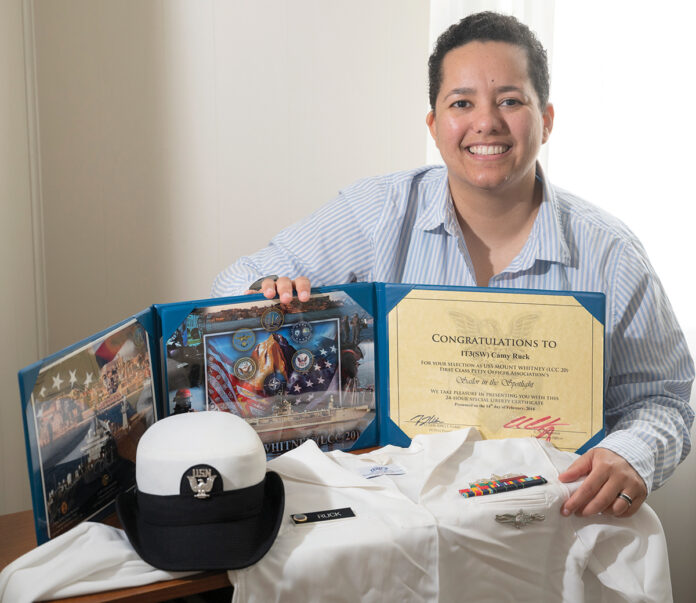Camy R. Ruck’s experience in the U.S. Navy from 2012 to 2018 equipped her with skills to be an information system technician overseeing computer networks containing top-secret information aboard the command ship USS Mount Whitney in Italy.
But when it came time to present those skills as assets for a civilian employer, Ruck says she called in for some support from the Southeastern New England Defense Industry Alliance, a membership alliance for defense tech, talent and innovation. The group operates a workforce development program using a $200,000 annual grant from the Real Jobs Rhode Island program under the R.I. Department of Labor and Training.
“For veterans, it can be hard to make that transition,” Ruck said. “A military resume is so tailored to working in the military. There’s a lot of military lingo and acronyms that make sense to me, but to others, they would not understand. You have to translate those things to the civilian world. And often, we’re not great at how to do it. But SENEDIA is good at being able to translate those military skills into soft skills that a civilian employer can understand.”
Established in 2002, SENEDIA operates from an office in Middletown with three full-time staff and two part-timers, serving the interests of 100 companies that do business with the U.S. Department of Defense, including names such as General Dynamics Electric Boat, Raytheon Technologies Corp., and Lockheed Martin Corp. The organization’s workforce development program is open to everyone seeking work in the defense industry, but it puts a special focus on helping veterans with landing internships and jobs.
During its most recent funding cycle that started in September, the SENEDIA program placed 10 veterans into internships, which come with a $1,500 stipend for 80 hours of work, according to the organization. SENEDIA officials said the program connected 12 veterans with permanent jobs and helped 35 veterans with resume support, certifications, networking opportunities, ongoing check-ins, interview practice and tips for negotiating salaries and benefits.
“Veterans who are transitioning into the civilian workforce aren’t used to having those kinds of conversations,” said Tim Fox, deputy executive director of SENEDIA.
Ruck says she heard of SENEDIA through a friend last year when she was having trouble finding a job. First, she was lined up for a two-week internship at the Newport Area Career and Technical Center supporting the information technology department at Rogers High School, then was hired as a systems engineer at KMS Solutions LLC at Naval Station Newport. She is now moving to a permanent job at General Dynamics Mission Systems in Dedham, Mass.
“What SENEDIA provides is they cut out the middle person,” Ruck said. “Instead of me putting my application online and waiting weeks and weeks until hopefully someone calls me, it went straight to the hiring person. It was a short turnaround between when they worked with my resume and sent it out on my behalf.”
In addition to the Real Jobs R.I. partnership program, SENEDIA has been operating under a two-year, $18 million contract from the U.S. Department of Defense since August 2020 to support workforce development efforts needed to help power the submarine building industry, providing training for 33 veterans to contribute to the delivery of Columbia- and Virginia-class submarines. The program has provided training on welding, sheet metal fabrication, machining, electrical work and pipefitting to hundreds of people, most of whom are not veterans, according to SENEDIA.
SENEDIA has also been in partnership since 2016 with the Community College of Rhode Island, R.I. Commerce Corp. and others to support the Pathways in Technology Early College High School program cybersecurity initiative, known as PTECH, which offers no-cost education opportunities for high school students pursuing a career in cybersecurity in the defense industry.
Molly Donohue Magee, SENEDIA executive director, says SENEDIA’s member companies are hungry for motivated military veterans to power their workforce, especially in this current economy that’s been marked by labor shortages.
“The industry really reaches out to veterans because No. 1, they honor their service, and No. 2, the skills and experience they have that make an invaluable member for any defense company,” Donohue McGee said.
That’s the case at KMS Solutions, says Charles J. McSoley, director of the Northeast region for the company, which is a provider of systems engineering, technical assistance and cybersecurity for the Navy.
“KMS is proud to offer opportunities to the strong veteran community, to transition from a military career to their next phase of life in an industry where they can continue to support the nation’s premier warfighting systems,” McSoley said.
Ruck says she’s grateful to SENEDIA for helping to get her career into gear in the civilian world.
“It was really the first step for me to find a job here,” Ruck said.
Marc Larocque is a PBN staff writer. Contact him at Larocque@PBN.com.











